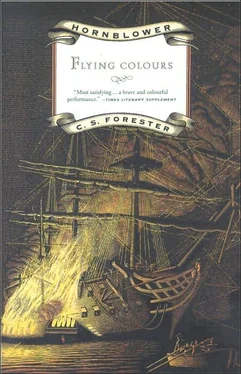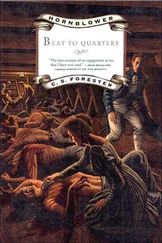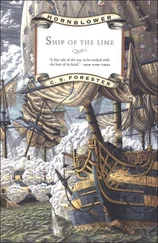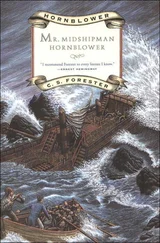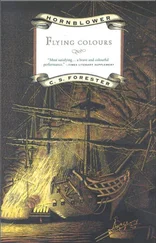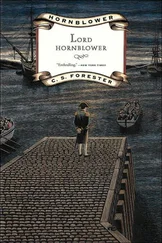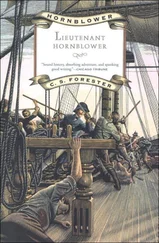Cecil Forester - Flying Colours
Здесь есть возможность читать онлайн «Cecil Forester - Flying Colours» весь текст электронной книги совершенно бесплатно (целиком полную версию без сокращений). В некоторых случаях можно слушать аудио, скачать через торрент в формате fb2 и присутствует краткое содержание. Год выпуска: 1989, ISBN: 1989, Издательство: Back Bay Books, Жанр: Исторические приключения, Путешествия и география, Морские приключения, на английском языке. Описание произведения, (предисловие) а так же отзывы посетителей доступны на портале библиотеки ЛибКат.
- Название:Flying Colours
- Автор:
- Издательство:Back Bay Books
- Жанр:
- Год:1989
- ISBN:0316289396
- Рейтинг книги:5 / 5. Голосов: 1
-
Избранное:Добавить в избранное
- Отзывы:
-
Ваша оценка:
- 100
- 1
- 2
- 3
- 4
- 5
Flying Colours: краткое содержание, описание и аннотация
Предлагаем к чтению аннотацию, описание, краткое содержание или предисловие (зависит от того, что написал сам автор книги «Flying Colours»). Если вы не нашли необходимую информацию о книге — напишите в комментариях, мы постараемся отыскать её.
Flying Colours — читать онлайн бесплатно полную книгу (весь текст) целиком
Ниже представлен текст книги, разбитый по страницам. Система сохранения места последней прочитанной страницы, позволяет с удобством читать онлайн бесплатно книгу «Flying Colours», без необходимости каждый раз заново искать на чём Вы остановились. Поставьте закладку, и сможете в любой момент перейти на страницу, на которой закончили чтение.
Интервал:
Закладка:
“We have no sugar, sir,” said the maid apologetically.
“It doesn’t matter,” answered Hornblower, sipping thirstily.
“It is a pity the poor wounded officer has to travel,” she went on. “These wars are terrible.”
She had a snub nose and a wide mouth and big black eyes—no one could call her attractive, but the sympathy in her voice was grateful to a man who was a prisoner. Brown was propping up Bush’s shoulders and holding a bowl to his lips. He took two or three sips and turned his head away. The coach rocked as two men scrambled up on to the box.
“Stand away, there!” roared the sergeant.
The coach lurched and rolled and wheeled round out of thegates, the horses’ hoofs clattering loud on the cobbles, and the last Hornblower saw of the maid was the slight look of consternation on her face as she realized that she had lost the breakfast tray for good.
The road was bad, judging by the way the coach lurched; Hornblower heard a sharp intake of breath from Bush at one jerk. He remembered what the swollen and inflamed stump of Bush’s leg looked like; every jar must be causing him agony. He moved up the seat to the stretcher and caught Bush’s hand.
“Don’t you worry yourself, sir,” said Bush. “I’m all right.” Even while he spoke Hornblower felt him grip tighter as another jolt caught him unexpectedly.
“I’m sorry, Bush,” was all he could say; it was hard for the captain to speak at length to the lieutenant on such personal matters as his regret and unhappiness.
“We can’t help it, sir,” said Bush, forcing his peaked features into a smile.
That was the main trouble, their complete helplessness. Hornblower realized that there was nothing he could say, nothing he could do. The leather-scented stuffiness of the coach was already oppressing him, and he realized with horror that they would have to endure this jolting prison of theirs for another twenty days, perhaps, before they should reach Paris. He was restless and fidgety at the thought of it, and perhaps his restlessness communicated itself by contact to Bush, who gently withdrew his hand and turned his head to one side, leaving his captain free to fidget within the narrow confines of the coach.
Still there were glimpses of the sea to be caught on one side, and of the Pyrenees on the other. Putting his head out of the window Hornblower ascertained that their escort was diminished to-day. Only two troopers rode ahead of the coach, and four clattered behind at the heels of Caillard’s horse. Presumably their entry into France made any possibility of a rescue far less likely. Standing thus, his head awkwardly protruding through the window, was less irksome than sitting in the stuffiness of the carriage. There were the vineyards and the stubble field to be seen, and the swelling heights of the Pyrenees receding into the blue distance. There were people, too—nearly all women, Hornblower noted—who hardly looked up from their hoeing to watch the coach and its escort bowling along the road. Now they were passing a party of uniformed soldiers—recruits and convalescents, Hornblower guessed, on their way to their units in Catalonia—shambling along the road more like sheep than soldiers. The young officer at their head saluted the glitter of the star on Caillard’s chest and eyed the coach curiously at the same time.
Strange prisoners had passed along that road before him; Alvarez, the heroic defender of Gerona, who died on a wheelbarrow—the only bed granted him—in a dungeon on his way to trial, and Toussaint 1’Ouverture, the Negro hero of Hayti, kidnapped from his sunny island and sent to die, inevitably, of pneumonia in a rocky fortress in the Jura; Palafox of Zaragoza, young Mina from Navarre—all victims of the tyrant’s Corsican rancour. He and Bush would only be two more items in a list already notable. D’Enghien who had been shot in Vincennes six years ago was of the blood-royal, and his death had caused a European sensation, but Bonaparte had murdered plenty more. Thinking of all those who had preceded him made Hornblower gaze more yearningly from the carriage window, and breathe more deeply of the free air.
Still in sight of sea and hills—Mount Caingou still dominating the background—they halted at a posting inn beside the road to change horses. Caillard and the escort took new mounts; four new horses were harnessed up to the coach, and in less than a quarter of an hour they were off again, breasting the steep slopes before them with renewed strength. They must be averaging six miles to the hour at least, thought Hornblower, his mind beginning to make calculations. How far Paris might be he could only guess—five or six hundred miles, he fancied. From seventy to ninety hours of travel would bring them to the capital, and they might travel eight, twelve, fifteen hours a day. It might be five days, it might be twelve days, before they reached Paris—vague enough figures. He might be dead in a week’s time, or he might still be alive in three weeks. Still alive! As Hornblower thought those words he realized how greatly he desired to live; it was one of those moments when the Hornblower whom he observed so dispassionately and with faint contempt suddenly blended with the Hornblower who was himself, the most important and vital person in the whole world. He envied the bent old shepherd in the distance with the plaid rug over his shoulders, hobbling over the hillside bent over his stick.
Here was a town coming—there were ramparts, a frowning citadel, a lofty cathedral. They passed through a gateway and the horses’ hoofs rang loudly on cobblestones as the coach threaded its way through narrow streets. Plenty of soldiers here, too; the streets were filled with variegated uniforms. This must be Perpignan, of course, the French base for the invasion of Catalonia. The coach stopped with a jerk in a wider street where an avenue of plane trees and a flagged quay bordered a little river, and, looking upward, Hornblower read the sign ‘Hôtel de la Poste et du Perdrix. Route Nationale 9. Paris 849’. With a rush and bustle the horses were changed, Brown and Hornblower were grudgingly allowed to descend and stretch their stiff legs before returning to attend to Bush’s wants—they were few enough in his present fever. Caillard and the gendarmes were snatching a hasty meal—the latter at tables outside the inn, the former visible through the windows of the front room. Someone brought the prisoners a tray with slices of cold meat, bread, wine, and cheese. It had hardly been handed into the coach when the escort climbed upon their horses again, the whip cracked and they were off. The coach heaved and dipped like a ship at sea as it mounted first one hump-backed bridge and then another, before the horses settled into a steady trot along the wide straight road bordered with poplars.
“They waste no time,” said Hornblower, grimly. “No, sir, that they don’t!” agreed Brown. Bush would eat nothing, shaking his head feebly at the offer of bread and meat. All they could do for him was to moisten his lips with wine, for he was parched and thirsty; Hornblower made a mental note to remember to ask for water at the next posting house, and cursed himself for forgetting anything so obvious up to now. He and Brown shared the food, eating with their fingers and drinking turn and turn about from the bottle of wine, Brown apologetically wiping the bottle’s mouth with the napkin after drinking. And as soon as the food was finished Hornblower was on his feet again craning through the carriage window, watching the countryside drifting by. A thin chill rain began, soaking his scanty hair as he stood there, wetting his face and even running in trickles down his neck, but still he stood there, staring out at freedom.
The sign of the inn where they stopped at nightfall read ‘Hôtel de la Poste de Sigean. Route Nationale 9. Paris 805. Perpignan 44’. This place Sigean was no more than a sparse village, straggling for miles along the high road, and the inn was a tiny affair, smaller than the posting stables round the other three sides of the courtyard. The staircase to the upper rooms was too narrow and winding for the stretcher to be carried up them; it was only with difficulty that the bearers were able to turn with it into the salon which the innkeeper reluctantly yielded to them. Hornblower saw Bush wincing as the stretcher jarred against the sides of the door.
Читать дальшеИнтервал:
Закладка:
Похожие книги на «Flying Colours»
Представляем Вашему вниманию похожие книги на «Flying Colours» списком для выбора. Мы отобрали схожую по названию и смыслу литературу в надежде предоставить читателям больше вариантов отыскать новые, интересные, ещё непрочитанные произведения.
Обсуждение, отзывы о книге «Flying Colours» и просто собственные мнения читателей. Оставьте ваши комментарии, напишите, что Вы думаете о произведении, его смысле или главных героях. Укажите что конкретно понравилось, а что нет, и почему Вы так считаете.
